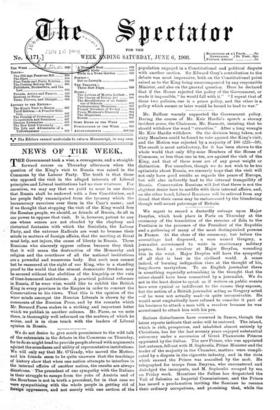We regret to record a dastardly outrage upon Major Dreyfus,
which took place in Paris on Thursday at the ceremony of the translation of the remains of Zola to the Pantheon in the presence of the President of the Republic and a gathering of many of the most distinguished persons in France. At the close of the ceremouy, but before the assemblage bad dispersed, a man named Gregory, a journalist accustomed to write in reactionary military papers, fired a revolver at Major Dreyfus, wounding him in the wrist. Major Dreyfus will have the sympathy of all that is best in the civilised world. A sense indeed, of burning indignation rises at the thought of his, long-drawn martyrdom. To an English journalist there is something especially astonishing in the thought that the crime should have been committed by a journalist. We do not in the least desire to speak as if writers on public events here were cynical or indifferent to the causes they espouse, but the notion of a British journalist acting as Gregory acted —if he were not actually mad—is quite inconceivable. He would most emphatically have refused to consider it part of his business to attack a man with a revolver because he was accustomed to attack him with his pen.






































